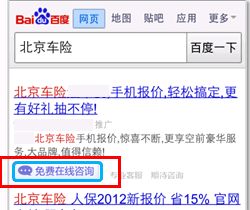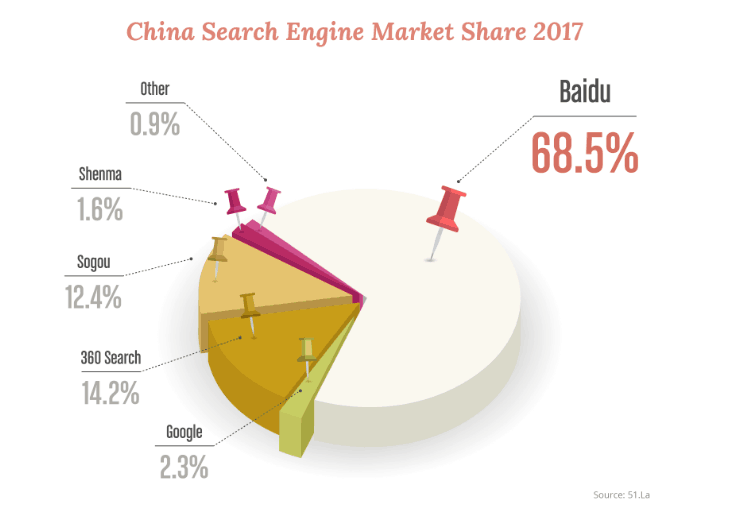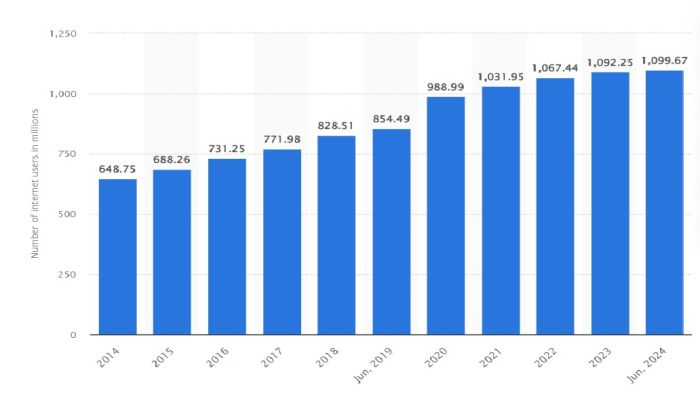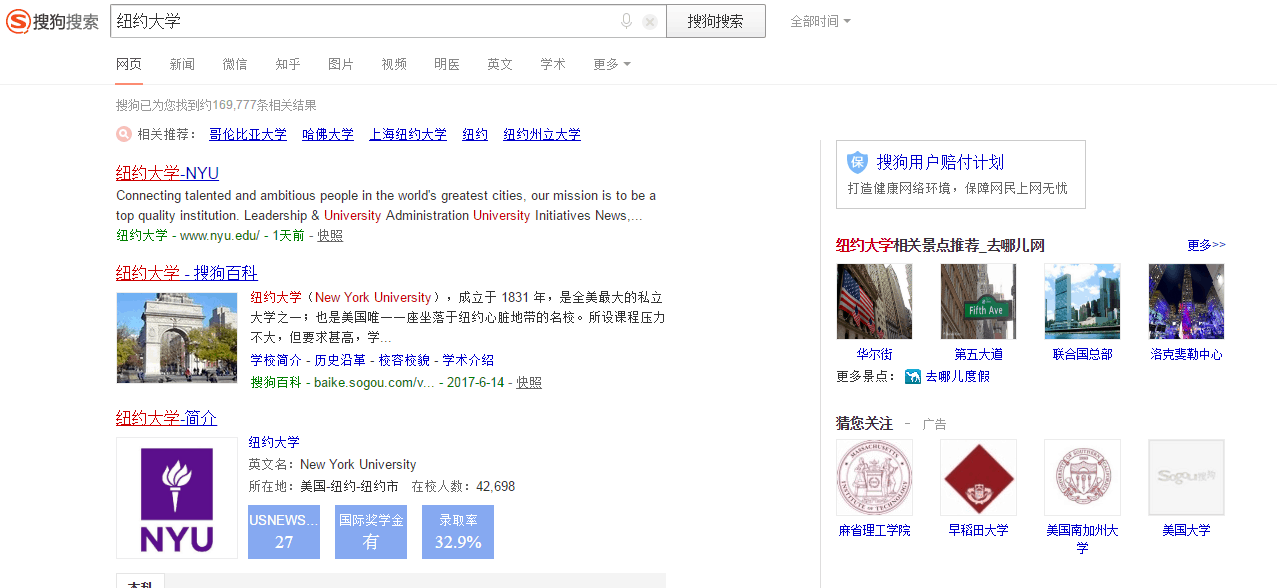
Getting to grips with Chinese digital marketing can be challenging for schools when looking at International Student Recruitment in China. Since the government has banned several globally popular internet sites, the country has developed an online ecosystem of its own. Several domestic sites command millions of users while remaining virtually unknown outside their homeland.
As a result, increasing your online search visibility in the country is a whole different ball game. With Google absent from the market, Chinese search engines like Baidu, Qihoo 360, and Sogou dominate, and schools need to familiarize themselves with entirely different search engine results page (SERP) outlays, SEO best practices, and paid search platforms.
In this blog, we examine the biggest players in the Chinese search market and discuss how schools should approach paid search and organic SEO to achieve the best possible results.
Baidu: Using ‘Google’ For International Student Recruitment in China
With a market share of more than 70%, Baidu is the ‘Google of China’ in more ways than one. Founded in 2000, the site originally replicated many aspects of Google’s design and approach. However, its singular focus on the Chinese market meant it could index and interpret Chinese language pages far more efficiently. As a result, Baidu quickly established itself as the country’s leading search engine and was already far more popular than Google when its competitor exited the market in 2010.
While Baidu has a lot of similarities to Google, there are several key differences in how it displays results. The most noticeable is its tendency to favour paid advertisements and results from its content platforms -such as its Chinese wiki Baidu Baike and Q&A forum Baidu Zhidao- over organic results. This excellent breakdown of a Baidu SERP from Nanjing Marketing Group illustrates what this looks like for users:

Source: Nanjing Marketing Group
Many schools can find this discouraging as you look at the comparative lack of space for organic results and wonder how you can find a way to cut through the noise. Nonetheless, applying SEO best practices can still help you improve your visibility and get accurate results on the site.
When looking at International student marketing in China, some of these techniques will be similar to those you would apply to Google and other globally popular search engines, such as strategic keyword integration and proper site architecture, such as title and header tags. However, there are some noticeable differences in how Baidu indexes and ranks content. Here are a few of the most important things to keep in mind when optimizing your site for Baidu:
Localize your domain name, website hosting, and language: Baidu heavily favours Chinese language content from Chinese sites, so schools looking to make headway in the market should look to create a Chinese language site hosted on a Chinese server. Having a .cn country code top-level domain (ccTLD) will also greatly increase your chances of being ranked on the site.
Keep your site architecture simple: While Baidu’s indexing tool, Baidu Spider, actually crawls sites more frequently than Google’s, it is not as advanced. It cannot recognize images or certain types of content, such as Flash. It will also not crawl too deeply into a site that is too complex or hard to understand. With that in mind, keeping your site simple and easy to read is paramount to SEO for Baidu.
Example: Conestoga College has a Chinese microsite for international student recruitment in China. Because it is smaller and simpler than the school’s main website, it is easier for Baidu to index. The site also has a .cn ccTLD.

The clickability of your content is important – One thing you will notice immediately when you start using Baidu is that any links you click on the SERPs will open in a new tab, keeping the search results page open. Baidu uses this feature to measure users’ click-through behaviour, monitoring how often they return to SERPs and click different links to better determine the relevance of the content.
Keep your content fresh—Baidu places much higher significance on the freshness of content than Google, which tends to value page authority more. Regularly updating your site will be essential to maintaining a good position in search rankings.
Backlinks are more valuable—Baidu still emphasizes backlinks more than other search engines, so any links you can attract could significantly improve your results. Remember that Baidu is also more likely to favour links from Chinese sites than foreign sites.
Meta Descriptions—While it has long been known that meta descriptions are not a ranking factor on Google, many experts believe that Baidu still gives them some weight, and optimizing them with keywords could affect your ranking.
Another thing that could prove fruitful for schools looking to optimize for Baidu is the rollout of the site’s Mobile Instant Page (MIP) project. Like Google’s AMP project, this open-source platform allows site owners to offer pages with faster load speeds for mobile users. During Baidu’s annual conference in Beijing in 2017, the company reported that MIP pages had reduced load times by up to 80% and landing page click rates by up to 30% for more than 2,800 sites.
MIPs offer less flexibility in terms of structure and content than regular pages. However, since many schools only offer simplified versions of their sites in China, they would likely not have to sacrifice too much to create MIP versions for their pages. Given the predominance of mobile devices among Chinese internet users and the importance Baidu places on speed in their search rankings, they could dramatically improve their results. Schools will find MIP plug-ins for popular content management systems like WordPress and can submit MIP pages to Baidu for indexing through Baidu Webmaster Tools.
What Paid Search Options Does Baidu Offer for Student Recruitment in China?
With the limited visibility that organic search on Baidu can provide, investing in paid search ads can be crucial for schools at all levels looking to gain a foothold in the Chinese market. Baidu Tuigang, the site’s paid search advertising platform, offers several potentially effective options for schools. Here’s a breakdown of the ad formats available:
Plain Text Ads—Baidu’s basic format resembles a Google PPC ad. It includes a 50-character title line and two 80-character description lines.
Sitelink Extensions—Baidu Tuigang users can add multiple links to their site in a single ad, greatly increasing your CTR. This allows you to give prospective students a few possible options to pique their interest.
Image Extensions– Baidu Tuigang users can add an image to an ad for no extra cost, although they do not necessarily show up in all searches. Nonetheless, the fact that it is free makes it a worthwhile option.
Multi-Image Ads—Baidu also offers multi-image ads, although this is more commonly used by businesses showcasing multiple products than schools.
Brand Zone Ads—This premium option allows organizations to produce large-scale advertisements that incorporate multiple images, videos, and text and occupy the top and right-hand sides of a Baidu SERP. However, the format is charged on a cost-per-time basis rather than clicks, with brands paying monthly, and it is very expensive, meaning it might not be a worthwhile investment for most schools.
This Brand Zone campaign from BMW will give you an idea of the format. Due to their expense, large corporations often only purchase Brand Zone ads.

Brand Starting Line—This scaled-down version of Brand Zone ads, priced from 15,000 Chinese Yuan (around USD$2,200), may present a more affordable option for schools.
Shantou Ads—A Shantou ad replaces the description lines of a default text ad with multiple text links. It can be very useful for schools looking to generate leads from multiple programs or those who want to drive traffic to several pages on their website.
Online Chat and Call Widgets—Schools can also include buttons in their ads that allow users to call or message their school directly from the SERP. This could be useful if you have Chinese-speaking staff to deal with direct inquiries from prospective students.

The biggest advantage of Baidu’s PPC formats over other search engines is that many ads are virtually indistinguishable from organic results, with only a small piece of text indicating a promoted result.
This can foster more trust from internet users and result in higher click-through rates. Baidu Tuigang’s targeting capabilities improved with its ‘People Targeting’ feature last year, allowing users to select audiences based on search behaviour and interests. Baidu’s analytics tool, Baidu Tongji, is also automatically linked to your Tuigang account, making it easier to track the results of your campaigns.
Schools looking to use Baidu Tuigang will need a fully functional Chinese website and set up their account through an approved Chinese agency, making it more difficult to get started than other paid search platforms. Nonetheless, the rewards exist for institutions that put in the time and effort to create effective campaigns.
Beyond Baidu: Using Qihoo 360 for Chinese Student Recruitment

According to a recent source, China accounts for over a billion internet users.

Source: Statista
While it is essential to include Baidu in your Chinese student recruitment efforts, it is worth noting that they are not the only search engine operating in the country.
Qihoo 360 was originally an internet security company whose free antivirus software became extremely popular in China. Its branded search engine—sometimes called 360 Search or Haosou—claims to be the most secure search engine available in the country, which has contributed to its growth in popularity, particularly given Baidu’s recent issues.

One attractive aspect of 360 Search for schools is that its SERP layout is far less ad-heavy than Baidu, making it easier to get your school on the front page organically. Qihoo 360 has also publicly criticized Baidu’s paid search results for being too similar to organic listings and strives to differentiate the two more in their SERPs.
Because Qihoo 360 is relatively new to the market, experts still have much to learn about its search algorithm. However, most advise that the best approach is to apply similar SEO practices to those that work on Baidu.
Qihoo’s advertising platform could also be an attractive option for schools. The company specifically targets small—to medium-sized businesses for its ads and often offers a far lower CPC than Baidu because there is less competition.
Like Baidu, Qihoo 360 offers default text ads, site link extensions, image extensions, multi-image product showcase ads, and a sub-menu format similar to Baidu’s Shantou ads. However, there are also several formats available which its competitor does not offer, including:
List Ads—This format displays multiple products with text only and includes a title, an introduction to each product, and four or five pieces of product information.
Recommended Links—This is a series of links that appear in the title and description lines and could be useful for schools looking to drive traffic to multiple pages.
Brand Express—Brand Express is a similar ‘takeover’ format to Baidu’s Brand Zone and is also charged monthly, albeit with a lower starting price of 50,000 Chinese Yuan per month, around USD$7,334.
Brand Sunrise– Like Baidu’s Brand Starting Line, this is a scaled-down version of Brand Express and displays a condensed version of the same information on the right-hand side of SERPs. Prices are negotiable but start at around 6,000 Chinese Yuan (USD$880) per month, less than half the price of Baidu’s equivalent service.

The amount of marketing effort you devote to Qihoo 360 will depend on its popularity among your targeted demographic. You should conduct market research to determine whether it is worthwhile. Nonetheless, it can offer some schools a more cost-effective alternative to Baidu.
WeChat Links Could Help Sogou Become a Major Player in Chinese Digital Marketing

Suppose you are looking at Strategies for attracting foreign students to China, even though it currently lags behind Baidu and Qihoo 360 regarding user numbers. In that case, there are several reasons why schools should pay attention to Sogou. Most importantly, the site is part-owned by social media giant Tencent, who gave Sogou exclusive rights to display results from WeChat. This makes it potentially useful for schools looking to use the immensely popular social network for student recruitment in China. Sogou also partnered with Bing to develop English-language services for its site, signaling its ambition for international growth.
As with Qihoo 360, most of the SEO best practices that apply to Baidu also apply to Sogou. Experts emphasize the importance of having a Chinese domain name and server, offering simplified Chinese content, having many backlinks, and optimizing your title and header tags.
Sogou also offers similar ad formats to other Chinese search platforms, including default text ads and site link extensions, which are both charged on a Pay-per-Click (PPC) basis, and Brand Zone and Right-Sided Brand Promotion formats, which are charged monthly.
One unique format offered is ‘Super Crown,’ a larger ad displayed at the top of SERPs. It contains images, columns, site links, and other components and is charged on a PPC basis.

Source: Nanjing Marketing Group
Sogou’s advertising options are usually cheaper than Baidu, although time will tell if the site’s increasing popularity—particularly among younger demographics—will drive prices up.
Schools should also monitor any further developments related to the integration of Sogou and WeChat. Given the latter’s popularity as an ‘all-in-one’ app with multiple functionalities, it wouldn’t be surprising if Tencent was looking to increase the functionality of WeChat’s search engine. Sogou may play a huge role in that.
While dealing with Chinese search engines can seem daunting, in practice, it is not all that different from working with Google or Bing. Baidu, Qihoo 360, and Sogou offer webmaster and analytics tools to help you track and measure your performance.
Nonetheless, schools should seek help and guidance from regional experts to ensure the success of their Chinese digital marketing efforts. The country’s unfamiliar online landscape always takes some getting used to, even for seasoned marketing and recruitment professionals. With a market for international students at stake, leaving no room for error is best.
FAQ To Consider
Is China accepting international students now?
Schools should seek help and guidance from regional experts to ensure the success of their Chinese digital marketing efforts. The country’s unfamiliar online landscape always takes some getting used to, even for seasoned marketing and recruitment professionals. With a market for international students at stake, leaving no room for error is best.







